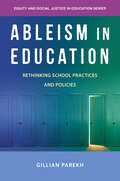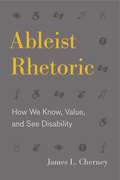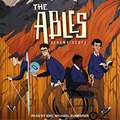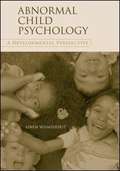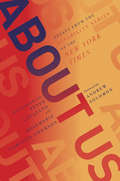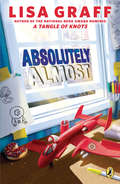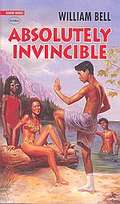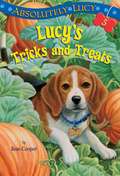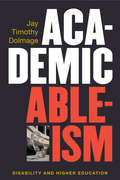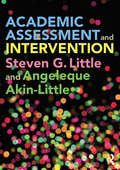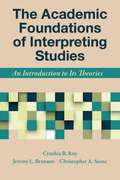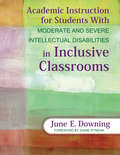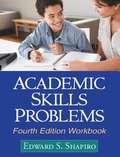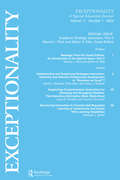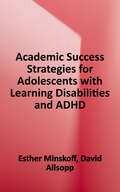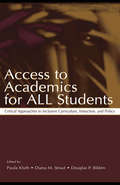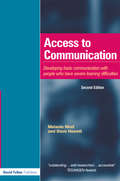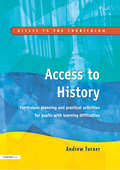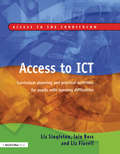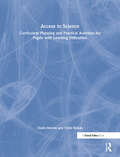- Table View
- List View
Ableism in Education: Rethinking School Practices and Policies (Equity and Social Justice in Education Series)
by Gillian ParekhHow we organize children by ability in schools is often rooted in ableism.Ability is so central to schooling—where we explicitly and continuously shape, assess, measure, and report on students’ abilities—that ability-based decisions often appear logical and natural. However, how schools respond to ability results in very real, lifelong social and economic consequences. Special education and academic streaming (or tracking) are two of the most prominent ability-based strategies public schools use to organize student learning. Both have had a long and complicated relationship with gender, race, and class.In this down-to-earth guide, Dr. Gillian Parekh unpacks the realities of how ability and disability play out within schooling, including insights from students, teachers, and administrators about the barriers faced by students on the basis of ability. From the challenges with ability testing to gifted programs to the disability rights movement, Parekh shows how ableism is inextricably linked to other forms of bias. Her book is a powerful tool for educators committed to justice-seeking practices in schools.
Ableist Rhetoric: How We Know, Value, and See Disability (RSA Series in Transdisciplinary Rhetoric #11)
by James L. CherneyAbleism, a form of discrimination that elevates "able" bodies over those perceived as less capable, remains one of the most widespread areas of systematic and explicit discrimination in Western culture. Yet in contrast to the substantial body of scholarly work on racism, sexism, classism, and heterosexism, ableism remains undertheorized and underexposed. In this book, James L. Cherney takes a rhetorical approach to the study of ableism to reveal how it has worked its way into our everyday understanding of disability.Ableist Rhetoric argues that ableism is learned and transmitted through the ways we speak about those with disabilities. Through a series of textual case studies, Cherney identifies three rhetorical norms that help illustrate the widespread influence of ableist ideas in society. He explores the notion that "deviance is evil" by analyzing the possession narratives of Cotton Mather and the modern horror touchstone The Exorcist. He then considers whether "normal is natural" in Aristotle’s Generation of Animals and in the cultural debate over cochlear implants. Finally, he shows how the norm "body is able" operates in Alexander Graham Bell’s writings on eugenics and in the legal cases brought by disabled athletes Casey Martin and Oscar Pistorius. These three simple equivalencies play complex roles within the social institutions of religion, medicine, law, and sport. Cherney concludes by calling for a rhetorical model of disability, which, he argues, will provide a shift in orientation to challenge ableism’s epistemic, ideological, and visual components. Accessible and compelling, this groundbreaking book will appeal to scholars of both rhetoric and disability studies, as well as to disability rights advocates.
Ableist Rhetoric: How We Know, Value, and See Disability (RSA Series in Transdisciplinary Rhetoric)
by James L. CherneyAbleism, a form of discrimination that elevates “able” bodies over those perceived as less capable, remains one of the most widespread areas of systematic and explicit discrimination in Western culture. Yet in contrast to the substantial body of scholarly work on racism, sexism, classism, and heterosexism, ableism remains undertheorized and underexposed. In this book, James L. Cherney takes a rhetorical approach to the study of ableism to reveal how it has worked its way into our everyday understanding of disability.Ableist Rhetoric argues that ableism is learned and transmitted through the ways we speak about those with disabilities. Through a series of textual case studies, Cherney identifies three rhetorical norms that help illustrate the widespread influence of ableist ideas in society. He explores the notion that “deviance is evil” by analyzing the possession narratives of Cotton Mather and the modern horror touchstone The Exorcist. He then considers whether “normal is natural” in Aristotle’s Generation of Animals and in the cultural debate over cochlear implants. Finally, he shows how the norm “body is able” operates in Alexander Graham Bell’s writings on eugenics and in the legal cases brought by disabled athletes Casey Martin and Oscar Pistorius. These three simple equivalencies play complex roles within the social institutions of religion, medicine, law, and sport. Cherney concludes by calling for a rhetorical model of disability, which, he argues, will provide a shift in orientation to challenge ableism’s epistemic, ideological, and visual components. Accessible and compelling, this groundbreaking book will appeal to scholars of rhetoric and of disability studies as well as to disability rights advocates.
The Ables
by Jeremy ScottI did have fantastic hearing, mostly by virtue of being blind. But that couldn't actually mean that he's trying to tell me I have super powers, right? Because that would be ridiculous. <p><p> It wasn't the "sex talk" he expected. Phillip Sallinger's dad has told him he's a custodian - a guardian - and his genetically inherited power is telekinesis. He'll learn to move objects with his mind. He's excited to begin superhero high school until he discovers he's assigned to a "special ed" class for disabled empowered kids; he suddenly feels like an outsider. Bullied, threatened, and betrayed, Phillip struggles, even as he and his friends - calling themselves the Ables - find ways to maximize their powers to overcome their disabilities, and are the first to identify the growing evil threatening humanity. As vital custodians disappear and the custodian leadership is mired in indecision, a mysterious and powerful figure taunts Phillip, and the enemy is poised to strike. But what if the next "one who does all," the multi-gifted custodian predicted to come, is one of the Ables? <p><p> The Ables is a fast-paced, captivating debut novel from Jeremy Scott, a bold, new voice in fantasy and science fiction.
Abnormal Child Psychology: A Developmental Perspective
by Linda WilmshurstAbnormal Child Psychology: A Developmental Perspectiveis intended for undergraduate and Masters-level students enrolled in courses in Abnormal Child and Adolescent Psychology. Written from a developmental perspective, the book is organized around five prominent and recurring themes: the course of normal development proceeds in an orderly and predictable direction; maladaptive behaviors represent deviations from the normal path; maladaptive behavior is represented by a continuum of severity (symptoms, syndromes, disorders) based on the degree to which behaviors deviate from the norm; individual, interpersonal, contextual and cultural factors interact in a reciprocal way to influence normal development and abnormal deviations; theoretical input from diverse perspectives can guide our understanding of underlying processes that precipitate and maintain behaviors and the different developmental pathways that might result. The text provides students with a learning model which incorporates three essential cornerstones, which are pivotal to understanding child and adolescent psychopathology: the K3 paradigm that consists of knowledge of developmental expectations, knowledge of the sources of influence, and knowledge of the theoretical models. Each chapter opens with a case illustration to highlight the themes of the material that follows. The chapters conclude with a Summary Review, Glossary of New Terms and a Set of Review Questions.
About Us: Essays From The New York Times' Disability Series
by Peter Catapano Rosemarie Garland-ThomsonBased on the pioneering New York Times series, About Us collects the personal essays and reflections that have transformed the national conversation around disability. <P><P> Boldly claiming a space in which people with disabilities can be seen and heard as they are—not as others perceive them—About Us captures the voices of a community that has for too long been stereotyped and misrepresented. Speaking not only to those with disabilities, but also to their families, coworkers and support networks, the authors in About Us offer intimate stories of how they navigate a world not built for them. Since its 2016 debut, the popular New York Times’ “Disability” column has transformed the national dialogue around disability. Now, echoing the refrain of the disability rights movement, “Nothing about us without us,” this landmark collection gathers the most powerful essays from the series that speak to the fullness of human experience—stories about first romance, childhood shame and isolation, segregation, professional ambition, child-bearing and parenting, aging and beyond. <P><P>Reflecting on the fraught conversations around disability—from the friend who says “I don’t think of you as disabled,” to the father who scolds his child with attention differences, “Stop it stop it stop it what is wrong with you?”—the stories here reveal the range of responses, and the variety of consequences, to being labeled as “disabled” by the broader public. <P><P>Here, a writer recounts her path through medical school as a wheelchair user—forging a unique bridge between patients with disabilities and their physicians. An acclaimed artist with spina bifida discusses her art practice as one that invites us to “stretch ourselves toward a world where all bodies are exquisite.” With these notes of triumph, these stories also offer honest portrayals of frustration over access to medical care, the burden of social stigma and the nearly constant need to self-advocate in the public realm. <P><P>In its final sections, About Us turns to the questions of love, family and joy to show how it is possible to revel in life as a person with disabilities. Subverting the pervasive belief that disability results in relentless suffering and isolation, a quadriplegic writer reveals how she rediscovered intimacy without touch, and a mother with a chronic illness shares what her condition has taught her young children. With a foreword by Andrew Solomon and introductory comments by co-editors Peter Catapano and Rosemarie Garland-Thomson, About Us is a landmark publication of the disability movement for readers of all backgrounds, forms and abilities. <P><P>Topics Include: Becoming Disabled • Mental Illness is not a Horror Show • Disability and the Right to Choose • Brain Injury and the Civil Right We Don’t Think • The Deaf Body in Public Space • The Everyday Anxiety of the Stutterer • I Use a Wheelchair. And Yes, I’m Your Doctor • A Symbol for “Nobody” That’s Really for Everybody • Flying While Blind • My $1,000 Anxiety Attack • A Girlfriend of My Own • The Three-Legged Dog Who Carried Me • Passing My Disability On to My Children • I Have Diabetes. Am I to Blame? • Learning to Sing Again • A Disabled Life is a Life Worth Living
Absent Citizens
by Michael J. PrinceDisability exists in the shadows of public awareness and at the periphery of policy making. People with disabilities are, in many respects, missing from the theories and practices of social rights, political participation, employment, and civic membership. Absent Citizens brings to light these chronic deficiencies in Canadian society and emphasizes the effects that these omissions have on the lives of citizens with disabilities.Drawing together elements from feminist studies, political science, public administration, sociology, and urban studies, Michael J. Prince examines mechanisms of exclusion and inclusion, public attitudes on disability, and policy-making processes in the context of disability. Absent Citizens also considers social activism and civic engagements by people with disabilities and disability community organizations, highlighting presence rather than absence and advocating both inquiry and action to ameliorate the marginalization of an often overlooked segment of the Canadian population.
Absolutely Almost
by Lisa GraffFrom the author of the National Book Award nominee A TANGLE OF KNOTS comes an inspiring novel about figuring out who you are and doing what you love. Albie has never been the smartest kid in his class. He has never been the tallest. Or the best at gym. Or the greatest artist. Or the most musical. In fact, Albie has a long list of the things he's not very good at. But then Albie gets a new babysitter, Calista, who helps him figure out all of the things he is good at and how he can take pride in himself.A perfect companion to Lisa Graff's National Book Award-nominated A Tangle of Knots, this novel explores a similar theme in a realistic contemporary world where kids will easily be able to relate their own struggles to Albie's. Great for fans of Rebecca Stead's Liar and Spy, RJ Palacio's Wonder and Cynthia Lord's Rules.
Absolutely Almost
by Lisa Graff<P>Albie has never been the smartest kid in his class. He has never been the tallest. Or the best at gym. Or the greatest artist. Or the most musical. In fact, Albie has a long list of the things he's not very good at. But then Albie gets a new babysitter, Calista, who helps him figure out all of the things he is good at and how he can take pride in himself. <P>A perfect companion to Lisa Graff's National Book Award-nominated A Tangle of Knots, this novel explores a similar theme in a realistic contemporary world where kids will easily be able to relate their own struggles to Albie's. Great for fans of Rebecca Stead's Liar and Spy, RJ Palacio's Wonder and Cynthia Lord's Rules.
Absolutely Invincible
by William BellFifteen-year-old George Ma, highly skilled in Shaolin self-defense, is crippled by loss of memory - the result of a horrific incident in his past. The agents of George's journey back to health are classmates "Hook," Amy, and Heather. The four friends form the Cripples' Club to fight against the cruelties of a gang at school. But the ultimate fight is for survival itself.
Absolutely Lucy #5: Lucy's Tricks and Treats (Lucy #5)
by Ilene Cooper David MerrellIlene Cooper's fifth story of a boy and his beagle follows Bobby and Lucy as they roll with the tricks and treats of Halloween.Tricks and treats-that's what Halloween is all about. This year, Bobby has lots of both! He has a special treat planned with his beagle puppy, Lucy. And the tricks? Bobby is getting those at school with the new kid, Jack. Bobby can't figure Jack out. And ever since Jack arrived, things have gone missing around the classroom. Halloween has never been so mysterious!From the Trade Paperback edition.
Academic Ableism: Disability and Higher Education (Corporealities: Discourses Of Disability)
by Jay T Dolmage<P>Academic Ableism brings together disability studies and institutional critique to recognize the ways that disability is composed in and by higher education, and rewrites the spaces, times, and economies of disability in higher education to place disability front and center. <P>For too long, argues Jay Timothy Dolmage, disability has been constructed as the antithesis of higher education, often positioned as a distraction, a drain, a problem to be solved. The ethic of higher education encourages students and teachers alike to accentuate ability, valorize perfection, and stigmatize anything that hints at intellectual, mental, or physical weakness, even as we gesture toward the value of diversity and innovation. <P> Examining everything from campus accommodation processes, to architecture, to popular films about college life, Dolmage argues that disability is central to higher education, and that building more inclusive schools allows better education for all.
Academic Assessment and Intervention
by Steven G. Little Angeleque Akin-LittleServing students with academic deficiencies necessitates communication and collaboration among professionals from several disciplines. Academic Assessment and Intervention brings together divergent approaches in order to demonstrate that scientific evidence, rather than biases or previous practice, must determine assessment practices that are selected and used for particular purposes. Similar to a handbook in its comprehensive topical coverage, this edited collection provides a contextual foundation for academic assessment and intervention; describes both norm-referenced and curriculum-based assessment/measurement in detail; considers the implications of both of these assessments on ethnically diverse populations; provides a clear link between assessment, evidence-based interventions and the RTI model; and considers other important topics related to this area such as teacher behavior. Intended primarily for graduate-level courses in education, school psychology, or child clinical psychology, it will also be of interest to practicing professionals in these fields.
The Academic Foundations of Interpreting Studies: An Introduction to Its Theories
by Cynthia B. Roy Jeremy L. Brunson Christopher A. StoneThe Academic Foundations of Interpreting Studies is the first introductory course book that explores the theoretical foundations used in sign language interpreting studies. Authors Roy, Brunson, and Stone examine the disciplines whose theoretical frameworks and methodologies have influenced the academic study of interpreting. With this text, explanations for how interpreted events occur, how interpreted products are created, and how the interpreting process is studied can be framed within a variety of theoretical perspectives, forming a foundation for the emerging transdiscipline of Interpreting Studies. As sign language interpreting has emerged and evolved in the last 20 years as an academic field of study, the scope of learning has broadened to include fields beyond the language and culture of deaf people. This text surveys six disciplines that have informed the study of sign language interpreting: history, translation, linguistics, sociology, social psychology, and cognitive psychology, along with their major ideas, principal scholars, and ways of viewing human interaction. Each chapter includes clear learning goals, definitions, discussion questions, and images to aid understanding. The Academic Foundations of Interpreting Studies is required reading for upper-level undergraduate or first-year graduate students in interpreting, Deaf studies, and sign language programs.
Academic Instruction for Students With Moderate and Severe Intellectual Disabilities in Inclusive Classrooms
by June E. DowningA useful resource for all educational teams who plan for students with moderate and severe intellectual disabilities. In each chapter Downing summarizes current, key research and offers practical applications from her wealth of experience in schools. Readers who are new to planning for students with severe disabilities will find excellent coverage of the basics like systematic instruction, positive behavior support, and collaboration. Professionals with extensive experience will benefit from the new ideas for planning, including specific examples of adapting academic content, considering both family goals and state standards in planning, and using universal design for learning.
Academic Skills Problems, Fourth Edition
by Edward ShapiroThis popular practitioner guide and text presents an effective, problem-solving-based approach to evaluating and remediating academic skills problems. Leading authority Edward S. Shapiro provides practical strategies for working with students across all grade levels (K-12) who are struggling with reading, spelling, written language, or math. Step-by-step guidelines are detailed for assessing students' learning and their instructional environment, using the data to design instructional modifications, and monitoring student progress. The research base for the approach is accessibly summarized. The companion workbook, available separately, contains practice exercises and reproducible forms. New to This Edition Incorporates the latest advances in evidence-based assessment and instruction. Shows how the author's approach fits perfectly into a response to intervention (RTI) model. Chapter and extended case example focusing on RTI.30 of the figures, tables, and forms are new or revised.
Academic Strategy Instruction: A Special Issue of Exceptionality
by Marcia L. Rock Edwin S. EllisThis special issue, Part II in a series devoted to the topic of strategic instruction, explores the issue of traversing the research to practice abyss through the implementation of authentic and effective business development. It reminds us that "business as usual" approaches to teacher in-service programs are unlikely to produce meaningful changes in teachers' classroom practices. In addition, this issue offers strategic instructional approaches to facilitate students' learning and focuses on structuring instruction to promote self-regulated learning. Each article raises important questions about existing practices and offers innovative alternatives to improve outcomes for students and teachers.
Academic Success Strategies for Adolescents with Learning Disabilities and ADHD
by Esther Minskoff David AllsoppWith this strategy-filled handbook, education professionals will learn what they can do to help students with mild disabilities—from high school to post-high school—develop academic skills in: organization, test-taking, study skills, note taking, reading, writing, and math. <p><p> First, educators will work one-on-one with students to evaluate each student's learning style and individual needs. Then, for each of the areas listed above, educators will get a chapter with step-by-step cognitive learning strategies, case studies, and charts that summarize the steps as mnemonic devices. An overarching five-step model (the Active Learner Approach) for effective instruction helps teachers introduce these strategies to students, model the steps of the strategies for them, give students guided and independent practice applying the strategies to assignments, and assist students in generalizing the strategies to other subjects and settings. <p><p>With this easy-to-use guide, educators will be able to help students recognize their learning characteristics, apply strategies to meet the specific demands of their coursework independently, and reach their educational goals.
Access To Academics for All Students: Critical Approaches To Inclusive Curriculum, Instruction, and Policy
by Paula Kluth Diana M. Straut Douglas P. BiklenThe authors of this book join a growing number of voices calling for teachers in diverse, inclusive schools to move beyond facilitating social participation in classroom activities and consider ways to intellectually engage ALL learners. They draw on emerging work linking critical theory with disability issues; work being done in curriculum studies around issues of social justice teaching, authentic instruction, service learning, and critical pedagogy; and the movement in the field of special education away from a deficit-driven model of education to an orientation that values students' strengths and gifts. Access to Academics for ALL Students: Critical Approaches to Inclusive Curriculum, Instruction, and Policy: *examines the perceptions teachers hold about students with disabilities, students who are racially and ethnically diverse, students using English as a second language, students labeled "at risk," students placed in both "high" and "low" academic tracks, and students in urban schools; *highlights how students who traditionally have been denied access to challenging work and educational opportunities can be supported to participate in academic instruction; and *provides ideas for recognizing and challenging inequities, offers a framework for fostering access to academics for students with a range of strengths and needs, and explores pragmatic ways of increasing academic success for all learners. This volume is appropriate for both undergraduate and master's level courses in curriculum and instruction, methods of teaching (special and general education), inclusive education, multicultural education, and cultural foundations of education. It will serve as a resource for elementary and secondary teachers, for school administrators, and for parents.
Access to Communication: Developing the Basics of Communication with People with Severe Learning Difficulties Through Intensive Interaction
by Dave Hewett Melanie NindThe award-winning creators of Intensive Interaction bring this groundbreaking book up to date with new material covering inclusion and emotional literacy. The book also includes: a brand new section looking at the program's implementation in preschool settings the particular benefits of Intensive Interaction for children who have Autistic Spectrum Disorders a 'how to do it' chapter including ideas for assessment case studies to help practitioners get to grips with the realities of using Intensive Interaction. This book has been updated to include the new SEN Disability Act (SENDA), and developments in new technology.
Access to History: Curriculum Planning and Practical Activities for Children with Learning Difficulties (Access To The Curriculum Ser.)
by Andrew TurnerThis accessible and practical teaching resource focuses on access to the history curriculum for pupils with learning difficulties. Within an inclusive framework of participation and achievement for all, the book provides activities designed to be accessible to pupils with diverse individual needs, guidance on the P levels, assessment and recording opportunities, and advice on teaching history in a cross-curricular way. By keeping in mind the needs of the busy practitioner, the book avoids jargon and concentrates on the real teaching opportunities.
Access to ICT: Curriculum Planning and Practical Activities for Pupils with Learning Difficulties
by Iain Ross Liz Singleton Liz FlavellFirst Published in 2005. Routledge is an imprint of Taylor & Francis, an informa company.
Access to Information: Materials, Technologies, and Services for Print Impaired readers
by Tom Mcnulty Dawn SuvinoThis is a book about alternative media for people with print disabilities
Access to Mass Transit for Blind and Visually Impaired Travelers
by Mark M. Uslan Alec F. Peck William R. Wiener Arlene SternAccess to Mass Transit addresses travel issues vital to independence for blind and visually impaired persons from several perspectives- those of blind and visually impaired persons who use mass transit, orientation and mobility instructors, and transportation professionals. Focusing on national and international issues, this information-filled manual covers approaches to making mass transit accessible in several cities in the United States and in Canada, the United Kingdom, and Japan. Arranged in a well-illustrated, easy-to-use format, tips, techniques, guidelines, and adaptive strategies are presented for safe and independent travel on subways, buses, and commuter rails.
Access to Science: Curriculum Planning and Practical Activities for Pupils with Learning Difficulties
by Claire Marvin Chris StokoeThis accessible and practical teaching resource focuses on access to the science curriculum for pupils with learning difficulties. Within an inclusive framework of participation and achievement for all, the core of the book provides support and ideas for the effective planning and implementation of well-differentiated science-focused activities. The book offers activities that are designed to motivate and challenge pupils with diverse individual needs; guidance on differentiation in early years and across all key stages; suggestions for teaching early developmental skills through sensory science; defined learning outcomes that demonstrate progression in curriculum content and experience; assessment and recording opportunities; and guidance on how to incorporate science in a cross-curricular way. Written by authors who have direct experience in the field, this book will provide practical help to all those working with pupils with learning difficulties in early years settings and in mainstream and special schools.
